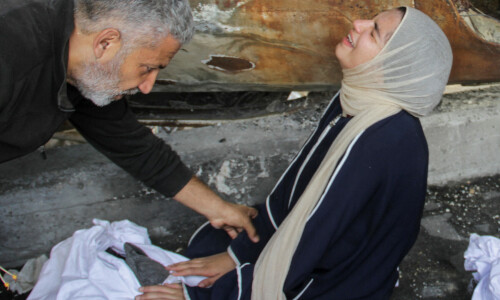DHAKA: Bangladesh’s war crimes tribunal sentenced chief of the Jamaat-i-Islami to death on Wednesday for crimes against humanity, including genocide, torture and rape, during the 1971 war.
The sentence passed on Motiur Rahman Nizami, a 71-year-old former legislator and minister, provoked protests, some violent, by supporters of his party who say the government has used the tribunal to weaken its political opponents.
“Considering the gravity of the crimes, the tribunal punished him with the death sentence,” state prosecutor Mohammad Ali told reporters.
Mr Nizami had already been handed down the death penalty in an arms smuggling case in January.
Jamaat-i-Islami said in a statement the people of Bangladesh were “surprised, stunned and deeply sad” at the sentence and called for a 24-hour general strike from Thursday and a 48-hour national stoppage from Sunday.
Police said Jamaat activists protested soon after the ruling and about 90 of them were detained in Mr Nizami’s home district.
Police also fired rubber bullets and tear gas to disperse activists of Jamaat and Shibir, the student wing of the party, in north-eastern Sylhet, 280km from Dhaka.
They vandalised around 20 vehicles and more than a dozen people were wounded in clashes with police.
“We had to fire rubber bullets and tear gas to control the situation,” said Mohammad Rahmat Ullah, additional deputy commissioner of Sylhet Metropolitan Police.
Additional police and paramilitary forces have been deployed across the country.
Law Minister Anisul Haque said the government would carry out the sentence as quickly as possible. “We are satisfied with the verdict and with this verdict justice has been established,” the minister said.
Defence lawyer Tajul Islam told reporters his client would appeal to the Supreme Court. “We are very unhappy with the judgment,” he said.
Prime Minister Sheikh Hasina set up the tribunal in 2010 to investigate abuses during the war.
Critics say the government has abused the process as a political tool to target the two biggest opposition parties, the Bangladesh Nationalist Party and Jamaat-i-Islami. This year, more than 100 people have been killed in protests over the tribunal’s verdicts.
The New York-based Human Rights Watch group has said the court’s procedures fall short of international standards.
Published in Dawn, October 30th, 2014














































